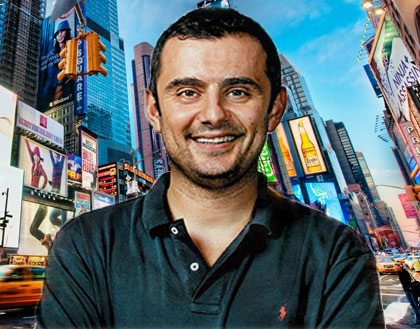Interviews
(Video) Michael Arrington – A Day In The Life Of A $10 Million Dollar A Year Blogger

Michael Arrington, the Owner & Founder of the 3rd biggest Technology Blog “TechCrunch.com” boasts an annual earning of $10 Million a year of Revenue from his successful tech blog through advertisements and endorsement deals. Michael Arrington is known for his no bars held style, speaking his mind wherever he goes. Even to this day Michael Arrington contributes articles and his time to Techcrunch.com with over 5 Million Subscribers and 30 Million monthly page views.
There is no doubt Michael Arrington knows what to do and how to do it when it comes to Successful Blogging. Checkout this Video and Interview with Michael Arrington on becoming a Successful Internet Entrepreneur.
Interview with Mike Arrington of TechCrunch.com
Michael Arringtons Story
Michael Arrington – I wake up in a pissed-off mood. I’m not a morning person. And I usually wake up to emergencies—an e-mail or a text message saying, “Oh, my God! Something big is happening! How could you not have written about this yet?’
If news is breaking, I want to be on it. We break more big stories than everyone else combined in tech—and that’s not prebriefed news or something that was handed to us. I judge my own performance based on that. When we break a story, that’s a point. When someone else breaks a story, we’re minus a point. And I want to be positive points.
I try to get up at 9 a.m. every day. One of the things my doctor wants me to do is regulate my sleep. A year ago, I’d work until I passed out, and wake up eight or nine hours later, which might be 4 p.m. or 3 a.m. Then I’d work again until I passed out. That was my life for four years—it got really bad. I missed a lot of social things. I didn’t keep up with friends. I was a mess. I actually gained 50 pounds in the five years since I started TechCrunch. So now I’m working with a doctor and trying to get reset. Getting up at the same time every day is apparently one of the best things you can do health-wise. The problem is, I still don’t go to sleep very early. So I’m usually working on four or five hours of sleep. Then I make it up on the weekends.
The very first thing I do in the morning is go right to my computer, which is always on. I’ll scan my e-mail for breaking news. If something big is going on, I’ll decide if I want to cover the story or assign it to another writer. Say a source sends me a tip that Google is buying Microsoft, and it’s going to break later today—I’m making this up, but that would be a big story. I’d start calling people at Google and Microsoft to see if it’s true or not.
Sometimes, it will be true, but the company will ask me to hold off. Negotiating with companies over how news breaks is a big part of what we do. I don’t think traditional journalists would do this or admit to it, but a source might say, “Yeah, we just got bought, but can you please not write about it for a week, because it might kill the deal?’ Unless I know lots of other journalists are sniffing around, I generally defer to the entrepreneur. We probably lose half of those stories, but it’s the right thing to do. It builds trust. People aren’t going to tell you things if they don’t trust you.
Usually around 11 a.m., after I have put out all the fires and there’s nothing left in my inbox that I have to address immediately, I’ll take a shower, get dressed, and walk my dogs. I have a chocolate and a yellow lab, and they’re my best friends.
I moved to the Seattle area in May. It’s calm, and my parents live nearby, so I see them a few times each week. I spend two-thirds of the time working here, and the rest of the time in our office in San Francisco. Right now, I don’t actually have a place in California, so I stay in hotels.
After my dogs are fed, I make myself something to eat and go back to my desk. My office is like a cave. I have blackout shades on the windows. I like the dark. There’s less distraction. I use a Mac with two 24-inch monitors, and I’ll do research on one screen and write on the other. It’s more efficient. I’d love to have three monitors, but Macs support only two. I have the exact same setup in my office in San Francisco.
I usually spend about half my day talking to sources, either on the phone or on IM. There are very few people in Silicon Valley—or in tech, in general—whom I don’t know pretty well. Chasing down stories is my favorite part of my job. My style is to bust the door down and clean the mess up later. That works pretty well for me. I’ve known a lot of my sources for five years now. When I call them, there’s no salutation—it’s just right to the point. I expect them to tell me what I want to know very quickly.
Our main competitive advantage is that my team and I truly love entrepreneurs. They’re my rock stars. I’ve always been fascinated by entrepreneurs. I had four businesses that did not work out. TechCrunch is my first real success, and it happened by accident. If I were to write a book, it would be about what drives entrepreneurs. I meet the winners, and the losers, too. Most of them could go out and get a perfectly reasonable job as an accountant or a lawyer. Instead, they risk everything for almost certain failure. The losers are actually more interesting sometimes. You learn a ton from failure.
I never develop friendships with people I don’t actually like. For instance, I write about digital music a lot. And the music labels are notorious for working the press. They’ll leak stuff and develop relationships, and it can actually be pretty fruitful as a journalist to get to know them. I hate ’em. They sue their customers. I see them as Darth Vader. Maybe it’s not fair, but I see the world in black and white. I don’t like them, so I won’t talk to them. My sources are all people I actually genuinely like, and I think they know that. They’re my friends, too.
I’m pretty unorganized when it comes to keeping track of my sources. I used to keep most of them sorted in my head. But then at some point in the past year, I suddenly lost my short-term memory. I don’t know if it’s just turning 40. One way I stay organized now is by using Google Voice. It keeps a record of all of my phone calls and text messages. When I make a call, I’ll almost always initiate it from my computer through this service. And if somebody calls my Google Voice number, it will ring my cell phone or my home phone—any phone I want. It also makes it easy to set up cell phones when I travel to Europe or Asia.
Text messages and phone calls tend to be the sort of cloak-and-dagger way I get tips and story ideas, but I also use Skype a lot. The video quality is great. When you go full screen, it’s like the other person is in the room. Skype also has screen sharing, so the person can hit a button and I can see their desktop. I use it a lot for business, and more and more for talking with friends.
I don’t like PR people for the most part. I like going to CEOs directly. If a PR person suggests I meet the CEO of this new company, I always say yes. But if they say, “Can we set up drinks? Or dinner?’ I say no. I hate that—it is a huge waste of time. Let’s meet over coffee or get on Skype video and talk about your company, but I don’t want to chitchat about your family, because I don’t know you. If I have time to go to dinner, I want to do that with my college friends or my parents or whomever I’m dating.
I usually post several times a week. When I first started TechCrunch, I would post several times a day. I’ve always been manic about it. You know that experiment where the rat hits the lever and the treat comes out? By the third day of writing, I got my first comment from somebody who wasn’t my mom. That’s the treat. Then people started subscribing to my RSS feed. Every day, that number would go up—10, 13, 100. That constant feedback is my reward. I still scan for comments on my posts. I can almost always predict how many comments I’ll get. Most are knee-jerk reactions, but sometimes there will be a few that are worthy of discussion, and I’ll chime in.
TechCrunch is known for our parties. That’s how I met all my sources in the early days. These days, we do three big blowouts every year, five or six smaller events, and then a few small parties. It winds up being an event every month, and I try to go to all of them. I started the tradition when I first moved to Palo Alto in 2005. I wrote a blog post inviting people to a party—10 people came. I made hamburgers. We drank beer and stayed up until 4 a.m. drinking Scotch by the fire. Two weeks later, I had another party, and 20 people showed up. About 100 people came to the next one, then 200. Venture capitalists were smoking pot in my backyard and passing out on my couch. I stopped having parties at my house, because it was getting trashed. About 1,000 people came to our party this summer.
Over the years, some people got upset when we didn’t cover them, and a certain percentage of those really made it personal. Or I’d write about how much I liked a start-up—or didn’t like a start-up—and people would get really passionate about that. Suddenly, there were people who really didn’t like me. And because I’m introverted—I like being alone—that actually made me pull in a little bit, and then more and more. The more I pulled in and stopped talking to people, the more people saw me maybe as arrogant.
So suddenly, I have all these enemies. In 2008, somebody spit on me at a conference in Germany. Before that, I had a death-threat incident—I had to hire private security 24/7 to protect me and my parents. We closed our office, and one of our employees got detained by police when he stopped by to check on things. Obviously, we sorted that out, but the whole experience freaked me out. I took off. I went to Hawaii for a month and didn’t bring my computer. Page views went up; everything was fine. That helped me realize that I am not nearly as important as I thought I was—and that the team I hired is really good. I’ve really let go since then. Now I really rely on them, and it’s really good.
I have never been very good at managing. I want to be writing, and it’s hard to be a coach and a player at the same time. Plus, I’m moody. That’s why I hired Heather Harde as CEO. She is steady. Erick Schonfeld, who is co-editor of TechCrunch, manages the editorial team. I talk with each of them maybe three times a week. We have never had an executive meeting. Instead, we use this program called Yammer to make sure everyone at TechCrunch is on the same page. It’s like a streaming bulletin board—anyone can post, and everyone will see it. If I think a writer or editor did a great job, I’ll give them a public high-five. Or if someone screwed up the formatting, I may point it out so others can learn from those mistakes.
Around 3 p.m., I usually take a break. I run errands or play fetch with my dogs. This summer, since I’d just moved, I did a lot of household things—like unpacking or buying a shower rod. Depending on my plans, I may go out to dinner with my friends or my parents. Or I’ll eat alone and then go back to work. Honestly, my goal these days is fitting real life in around the work.
After dinner, I’m usually back at the computer. That’s when I do thought and opinion pieces. I’ll spend two or three hours on one post. For example, in July, a CNN journalist was fired for tweeting her opinion about a Hezbollah leader. I wrote a piece about how ridiculous it was that she could not have an opinion.
I like working late at night. There are no interruptions. I usually listen to music when I write. I like hard music that is not happy music—Metallica, Eminem, Rage Against the Machine.
I might go until midnight or 6 in the morning. No matter what time it is, I always read before I go to bed—even if it is only a few pages. Usually fiction and always an actual printed book. My favorite book is Catch-22. And then I fall asleep, happy.
Michael Arrington Interview By: Inc.com
Interviews
The Questions You Have Always Wanted To Ask A Spiritual Leader
It’s not often we get to sit on the floor, barefoot and in lotus position while interviewing a spiritual author whose journey and teachings have positively influenced the lives of hundreds of thousands of people.
Interviews
(Video) Gary Vaynerchuk’s Unforgettable Advice For Achieving Success

We recently caught up with the multi-millionaire entrepreneur Gary Vaynerchuk for an exclusive, one of a kind interview. Gary is an entrepreneurial wizard, with unforgettable advice for all with a humble yet electric personality and charm.
Gary was able to build his family wine business from 3 Million to 60 Million in a matter of years using creative and innovative marketing techniques, on and offline. His company “VaynerMedia” are the brains and promotional orchestrators behind some of America’s largest companies and personalities. (more…)
Interviews
Captain America “Chris Evans” Shares His Advice For Success and Acting
Chris Evans, the actor of Captain America recently appeared on Spreecast for a live Q&A with his fans and had an awesome amount of positive energy and inspirational advice to share with his followers.
We transcribed Chis Evans great answers and advice just for you. (more…)
Interviews
(Video) The Amazing Life Of Tony Robbins | The Biography Of The #1 Peak Performance Coach
-

 Business4 weeks ago
Business4 weeks agoWhy Entrepreneurs Should Care About AI Automation Testing
-

 Business4 weeks ago
Business4 weeks agoWhat Every Business Owner Should Know Before Investing in API Integration
-

 Did You Know4 weeks ago
Did You Know4 weeks agoThe SEO Traps Even Experienced Marketers Fall Into
-

 Business4 weeks ago
Business4 weeks agoWhy Smart Entrepreneurs Are Quietly Buying Gold and Silver
-

 Business3 weeks ago
Business3 weeks agoHow Smart Brands Use Instagram Data to Outperform Competitors
-

 Business3 weeks ago
Business3 weeks agoThe Paradox of Modern Work: Can Tech Make Us More Human?
-

 Change Your Mindset2 weeks ago
Change Your Mindset2 weeks agoThe Hidden Reason You Can’t Stay Consistent
-

 Entrepreneurs1 week ago
Entrepreneurs1 week agoThe Six Pillars That Ground Purpose-Driven Leadership (The Berenyi Life Blueprint)





























3 Comments